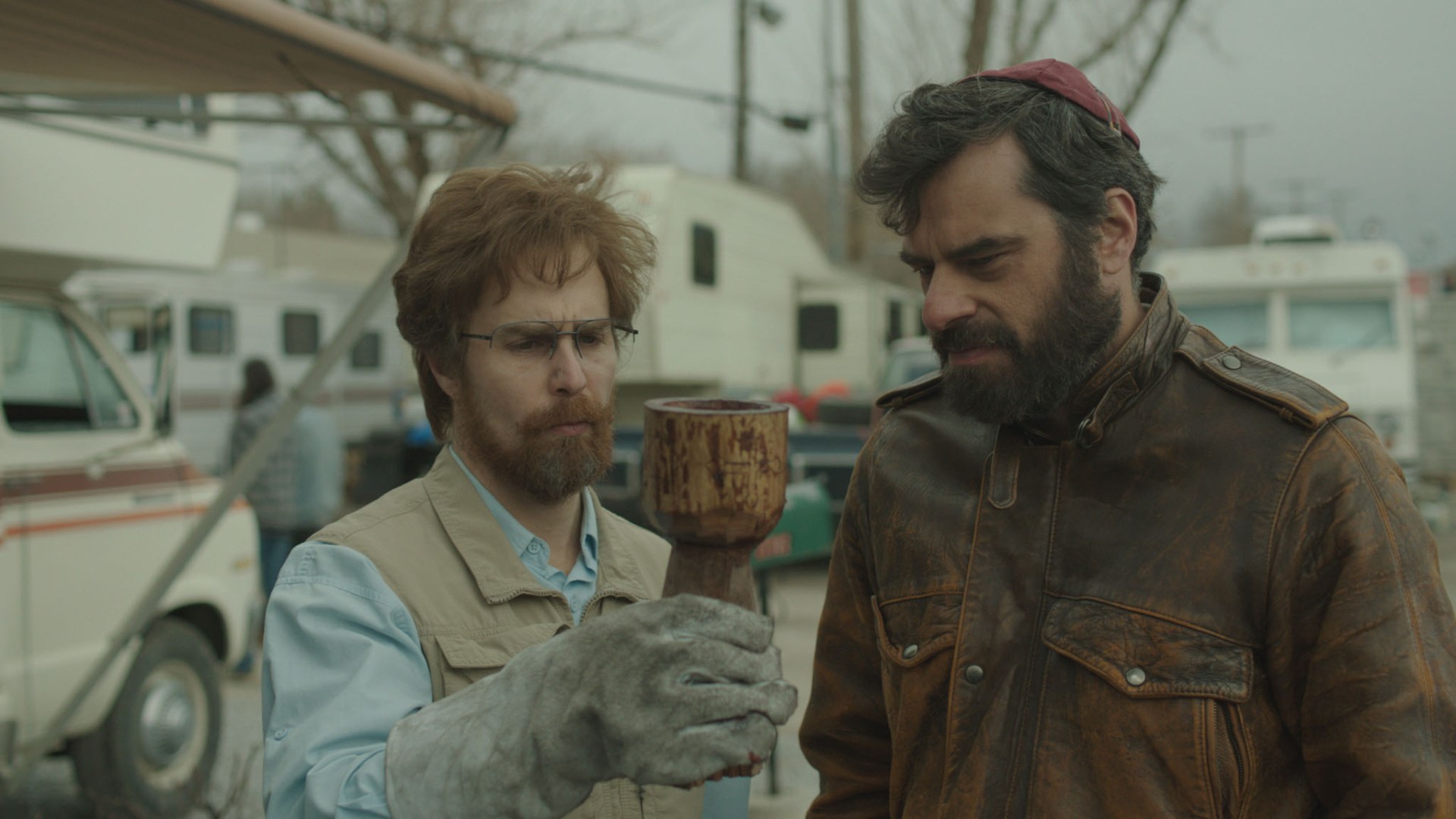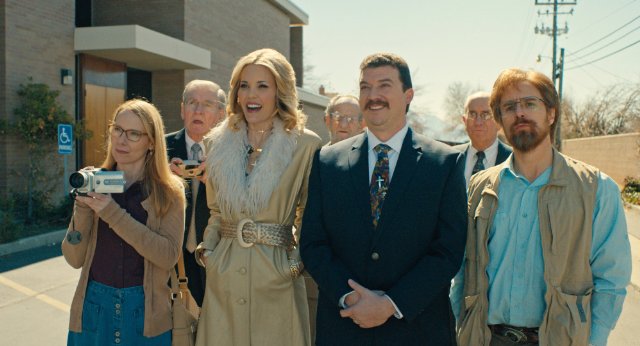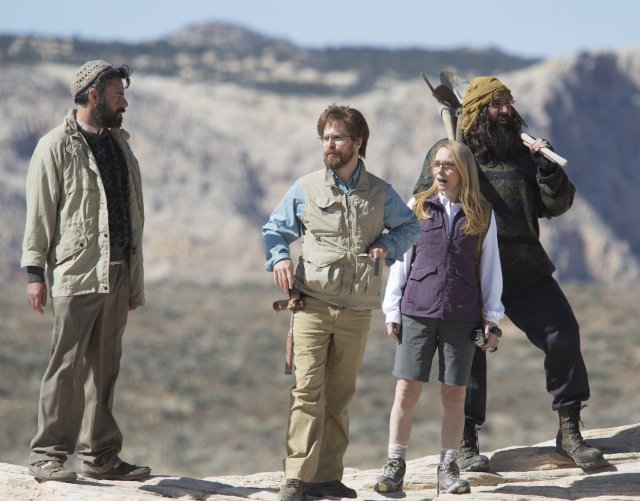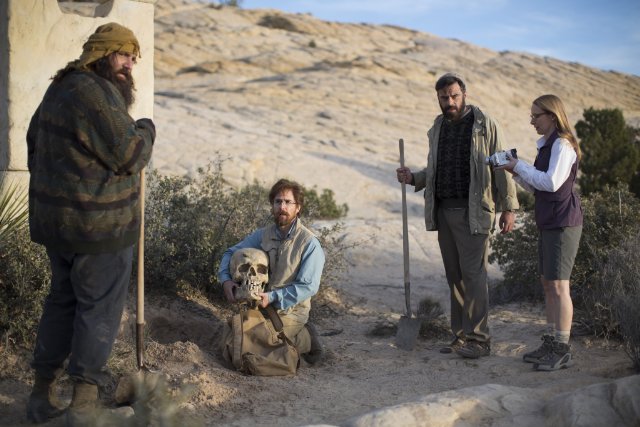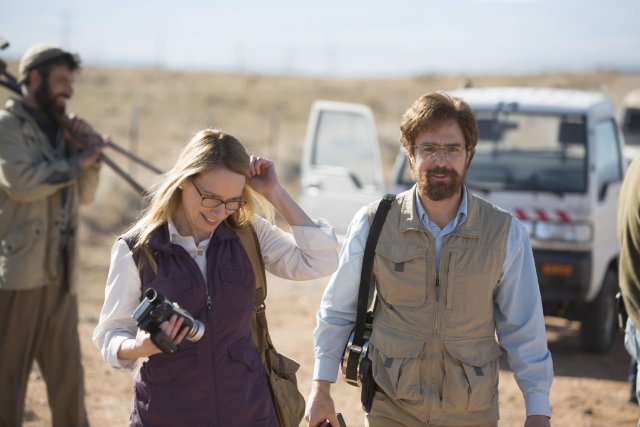 Adam Metcalf / Lionsgate
Adam Metcalf / LionsgateI mean this in a good way: Don Verdean probably never had much of a chance. It’s a satire set in American church culture, which means it will offend those Christians who don't find that funny. And a lot of its humor relies on the audience's insider knowledge of the obsessions and verbal tics of a subculture to which many of them don't belong.
That probably explains why, the first time I saw it, the laughter in the theater was restricted to a few chuckles—except for two people obnoxiously howling at the screen. One was some guy near the back of the room. The other was me.
Jared and Jerusha Hess (the Mormon filmmakers who brought you Napoleon Dynamite and Nacho Libre) tell the story of Don Verdean (Sam Rockwell), a “Biblical archaeologist” who's built his career and reputation on work he believes in wholeheartedly. He digs up discoveries in Israel and brings them to the United States. From there, a 1990s-style promotional video tells us at the beginning, Don travels around the country with them, “confirming . . . beliefs in the miraculous narratives contained in the Bible.”
Ten years after the video was shot, though, Don's star has fallen a little. He drives around in his RV, giving talks to conferences, church groups, and Bible studies about his finds. He can still draw a crowd, and he still believes the work is a vital part of saving souls, but the money isn't coming in like it used to and things are getting tough. So he and his devoted assistant Carol (Amy Ryan) are delighted when Tony Lazarus (Danny McBride), pastor of the flourishing Lazarus Fellowship Center, invites them to a meeting at his church.
“Church attendance in American has been in a massive decline for years,” Lazarus tells them. “And I've been feeling the effects of that right here in my congregation. Slowly but surely, this nation is becoming godless, and it's frightening.” Not to mention, he adds, that a new church in town pastored by Fontaine, a former Satanist (Will Forte), who is siphoning away his flock (and, of course, his tithes and offerings). Lazarus's solution is to bankroll Don's efforts, on the condition that he bring his archaeological finds to the Lazarus Fellowship Center to attract a crowd—all to save souls, of course. “These younger generations, they need proof,” he says. “They need hard evidence in these dark, dark times. And I believe that the Lord has been preparing you. The Lord wants you to be his instrument in this great work.”
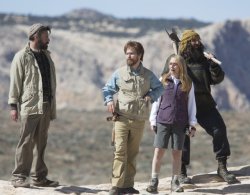 Adam Metcalf / Transcendent Productions
Adam Metcalf / Transcendent ProductionsSo Don gets on the phone with Boaz (Jemaine Clement), his contact in Israel and a man of few scruples, who sells him a pillar of salt he swears is Lot's wife, and transports it across the ocean so it can conform to the vision of Lazarus's wife Joylinda: ”It would be like a holy land set here in the good old U. S. of A.,” she declares. “Right here, where it should be. Not over there.” The pillar's unveiling—which provides the occasion for one of the film's funniest scenes, in which Joylinda sings a song with the refrain “pillar of salt / it's all her fault / she should have turned back when her husband shouted halt”—is enough of a success to launch another mission. This time, Don says, they should go after the “Goliath skull.” So he and Carol head for Israel and meet up with Boaz for the hunt.
But finding the skull isn't as easy as it has been, especially when the dig site gets shut down by the Israeli police for lacking a permit. With Tony Lazarus breathing down his neck via long-distance phone calls, reminding him that souls are at stake, Don is driven to extreme measures. And when he's found out, everything starts getting really complicated.
Something about Don Verdean feels a lot like a lightly satirized version of an inspirational, “faith-based” movie. Seen one way, it plays like a dramatized sermon illustration: our protagonist was once a man of faith, but is turned aside by temptation and lack of faith in God’s provision toward moral failing. He pays the price for his sins. But look how God can redeem even your mistakes for his good! The movie employs a lot of visual deadpan humor: the costumes, for instance, are straight from the 1990s, which is a slight exaggeration on the oft-stated axiom that evangelicals tend to run about a decade behind mainstream culture.
The trickiest thing about Don Verdean is sorting out what exactly it's skewering. One answer—a too-easy one—is that it's making fun of religion or religious people. To come up with that answer, however, requires lumping all religious people into one category and suggesting that satirizing one is satirizing them all, though certainly part of its humor comes from magnifying some of the sillier parts of American evangelical subculture. People utter phrases like “Holy Ghost Power” and “Praise God” as punctuation; the term “Potiphar's wife” is used to refer to a woman with “loose morals”; one character rails against certain breakfast cereals for their godless conspiracy to lead the faithful astray.
But the film doesn't offer a blanket characterization at all. Instead, Don Verdean gives us an array of people to grapple with, Christian and not, whose hearts harbor varying degrees of what you might call purity. Carol is the hero of the story, a woman of unswerving faith and integrity who is celebrated and respected by the film; the rival ministers are actually just power-hungry manipulators.
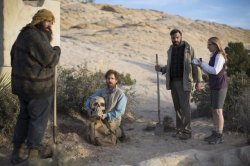 Adam Metcalf / Lionsgate Premiere
Adam Metcalf / Lionsgate PremiereDon's story takes him on a journey between those extremes—at the start, he's a man who believes what he's doing is right and that these finds are legitimate, more or less because God helped him find them. When he finally stoops to fraud, it's still in service of the ultimate goal, and that's what makes him interesting, as a character. It's not money or prestige he's after, not really. It's what he sees as God's calling on his life. He becomes convinced that the means are acceptable, so long as the end is saving souls. And this is seemingly something he’s warned himself against, judging from the sign that simply says “James 1:8” placed beneath his name on the side of his RV. (That verse states that “A double-minded man is unstable in all his ways.”)
The film gestures at but doesn't dwell on the most obvious ethical issue: Don is literally stealing artifacts from Israel, digging without a permit but suggesting that it's fine because it's all in service of the kingdom of God and saving souls. Certainly, that's a caricature, and the topic of “Biblical archaeology” can be a strange one—we cover it occasionally here. But the real villain of the film isn't faith or even some dubious archaeology. Rather, it's a culture that requires bigger and bigger thrills in order to keep people hooked. Fontaine's church is siphoning away believers from Lazarus's precisely because there are more fantastical curiosities to behold—a former Satanist!—and Lazarus archaeological discoveries are required to keep believers in their pockets and pocketbooks. They have to prey upon the faithful in order to stay on top, and they're willing to go to great expense to do so.
 Adam Metcalf / Lionsgate
Adam Metcalf / LionsgateIn this way, Don Verdean has something in common with another satire of Christian subculture—Believe Me (which we reviewed here). Both look with humor at how certain aspects of a slice of church culture in America are ripe for exploitation by those with few moral qualms. Don Verdean is a pleasingly entertaining, sometimes hilarious, quietly satirical take on what makes us tick as a subculture, and a reminder that what we think God wants can be shaped in some pretty dubious ways—including our own double mindedness.
Caveat Spectator
The film's PG-13 rating is pretty mild, and comes largely from some off-color jokes and some euphemistic references to male and female body parts in discussions of “Lot's wife” and various breakfast cereals. There are also a few places where people (unwittingly) utter the kind of double entendres that sometimes get uttered at church. One character speaks about his desire to get a smoking hot wife (which may only make you chuckle if you're evangelical) and the reasons why.
Alissa Wilkinson is Christianity Today's chief film critic and an assistant professor of English and humanities at The King's College in New York City. She is co-author with Robert Joustra of How to Survive the Apocalypse: Zombies, Cylons, Faith, and Politics at the End of the World (Eerdmans, May 2016). She tweets @alissamarie.

